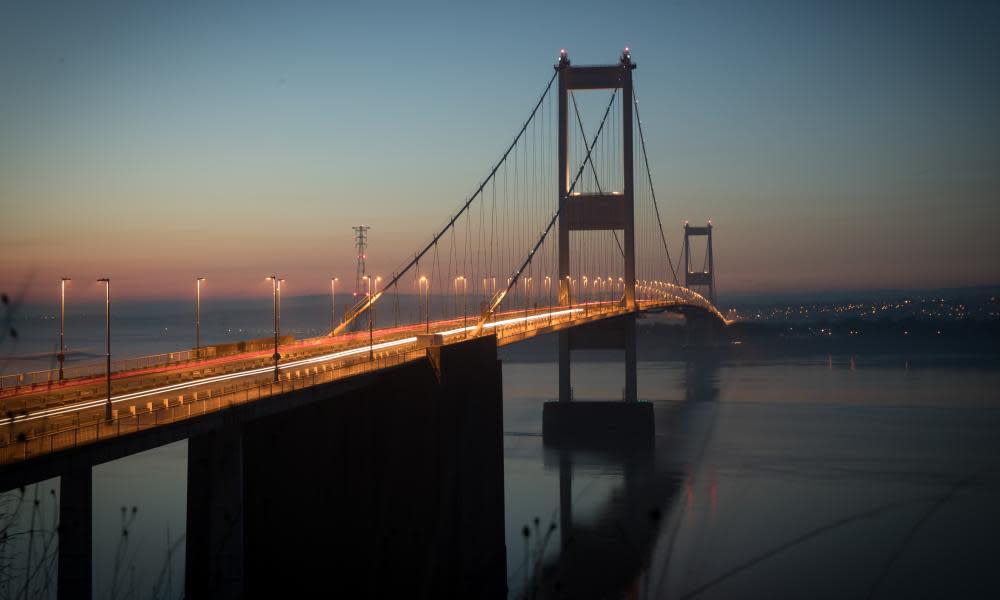'Western powerhouse' could rival London and north, say backers

The abolition of the tolls on the Severn bridges creates a “once in a lifetime” chance to create a cross-border economic region that will rival the northern powerhouse and challenge the south-east of England, politicians, business leaders and academics have said.
The decision to make the crossings between the west of England and south Wales free later this year could lead to a “western powerhouse” stretching from Bath and Bristol to Newport, Cardiff and Swansea and leading to a boost in prosperity and jobs, advocates believe.
A summit was held on the Welsh side of the border at the Celtic Manor resort to discuss how the regions on either side of the bridges could benefit. Attendees also heard the move could bring cultural and sporting benefits as, for example, schools and clubs would be more willing to travel across the border.
But the summit was also told that the abolition of the tolls, coupled with poor road and rail connections, could cause congestion. In addition fears were voiced that abolishing the charges would create a spike in property prices in places such as Monmouthshire on the Welsh side of the bridges and force local people out of the area.
The summit was called by Alun Cairns, the secretary of state for Wales, who said cancelling the tolls created a “profound” chance for economic change. He said: “Can you imagine if there was a £6.70 charge to travel between Bath and Bristol or Newport and Cardiff? Imagine the distortive effect that would have on the economy. That is what has been in place here for 50 years because of the Severn tolls.
“Cardiff and Bristol are 40 miles apart, Newport is even closer. By removing the tolls, we’re creating an opportunity for a much stronger region on the western side of the UK.”
Cairns said he knew a haulier who spent £500,000 a year on tolls but also gave the example of a florist from Chepstow on the Welsh side of the Severn. He said: “If they get an order from the other side of the crossing, the charge makes it prohibitively expensive. Now that market will be made available.”
The two bridges are used by more than 25m vehicles a year. Despite the charges more people already commute between Bristol and Cardiff than Liverpool and Manchester.
Cairns said: “Our individual strengths are many but by pooling our resources, expertise and experiences we can deliver the best ideas, world-leading projects and innovations and also cultural, tourism and sporting opportunities to beat any other part of the UK.”
He added that the bridges had been a “symbolic” as well as a financial barrier. “When the tolls go it will be just be a stretch of motorway. Today is start of a process by which we can bind the region together.”
The concept of a “Severnside” region has been around for decades. Welsh devolution is seen as one of the reasons why the concept slipped down the agenda but Brexit has led to a reassessment.
Dylan Jones-Evans, assistant pro-vice chancellor at the University of South Wales, said motorists and haulage companies had felt “penalised” for entering Wales and said the abolition of the tolls was a “once in a lifetime” opportunity.
He said: “At at time when the UK faces economic challenges as a result of the decision to exit the European Union it’s vital that regional economies of the UK work closely together.
“Many businesses on both sides of the bridges felt [the tolls] formed a major psychological and financial barrier. Wales was seen as being separate from the rest of the UK economy.”
But he warned: “The current transport provision for road and rail between south Wales and the south west of England is not fit for purpose for a modern 21st-century economy.”
Denise Lovering, director of Glenside Commercials, a Welsh company that supplies commercial vehicles, said her business was already planning to expand its operation on the English side of the Severn.
Grant Mansfield, of the television production company Plimsoll Productions (with offices in Bristol, Cardiff and Los Angeles) said creating a super-region could help sectors like his challenge London and the south-east.
Jez Becker, a Chepstow councillor, said the abolition of the tolls was a great opportunity but he warned there was a lack of resilience in the transport system. He said: “If we want to take advantage of this opportunity we need to work better rather than talk better.”

 Yahoo News
Yahoo News 
